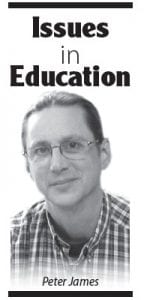How do we prepare students to be successful in life? That question is at the root of public education and there is no simple answer. However, as current researchers have shifted from asking why students fail to why they succeed, their answers are both familiar and challenging.
It turns out that a person’s intelligence—often referenced as their Intelligence Quotient or IQ— is not as good a predictor of future success as something called their grit score. Initially posited by Dr. Angela Duckworth, grit is defined as “persistence and passion for long-term goals” and has been successfully measured and tested for validity in multiple studies. Whether the subjects were West Point cadets, spelling bee contestants, inner-city high school students, or corporate sales professionals, grittiness was the most important characteristic of those achieving their goals. Not IQ, not talent, not race, not income, not well being, not family composition, nor any other measure was more significantly correlated with success than grit.
So what are the implications for education? For one, it means we need to abandon the idea that “some kids have it and some kids don’t.” While there is some debate over whether or not intelligence is fixed, the evidence shows that everyone who persists in learning is capable of continued growth throughout his or her lives.
It is true that some students have higher IQs, some learn more quickly, and some have an easier time getting high scores on standardized tests than their peers. While some may say those facts prove some people are smart and others are not, I believe that view misses the point, because those scoring highest are not always the most successful in life.
Our current focus on improving reading and math test scores reinforces the view that a certain type of intelligence is essential for success, a view that benefits most those students who have learning styles that align well with current methods of instruction. It devalues certain types of learning and undermines many effective strategies for helping all students benefit from public education.
If we accept that our ability to learn is fixed and that learning is easy for smart people, then it’s easy to see why schools give up on students who struggle or why students who had an easy time in school early on decide to give up on themselves when their studies become more difficult. Instead, if we accept that everyone has an ability to learn and that learning is an ongoing process, then we can begin to remove the barriers to learning incumbent in our education system, such as limits on the amount of time students have to learn something, limits on the ways they can be taught, limits on the ways they can demonstrate their understanding, and, ultimately, limits on who we allow to achieve success.
To help students achieve more, I also believe we need to add the word “yet” to our feedback, as in, “No, you don’t know that…yet” or “You’re right, you can’t do that…yet”. Establishing what researchers have dubbed a “growth mindset”— a view that important learning continues throughout our lives—is important for every parent, school, and community wanting to support its students. We can do that by helping students to recognize what they have already learned, to understand that they can continue to learn, to see the value in working through their challenges with vigor, to develop a long-term vision around their passions, and to strive through setbacks to achieve their goals.
We can also do that by making sure changes to our education system provide a framework that empowers schools to respond to the needs of their students and community—a framework supporting new efforts to help all students develop strong character, motivation, and growth.
If any of this new research sounds familiar, then perhaps you’ve heard this famous quote:
“Nothing in this world can take the place of persistence. Talent will not; nothing is more common than unsuccessful people with talent. Genius will not; unrewarded genius is almost a proverb. Education will not; the world is full of educated derelicts. Persistence and determination alone are omnipotent. The slogan “press on” has solved and always will solve the problems of the human race”
Calvin Coolidge offered these words back in 1932. Have we learned this lesson? Perhaps not … yet.
Each month a representative of our local schools will offer thoughts in Issues in Education. This month’s contributor is Peter James, Great Expectations School.



Loading Comments